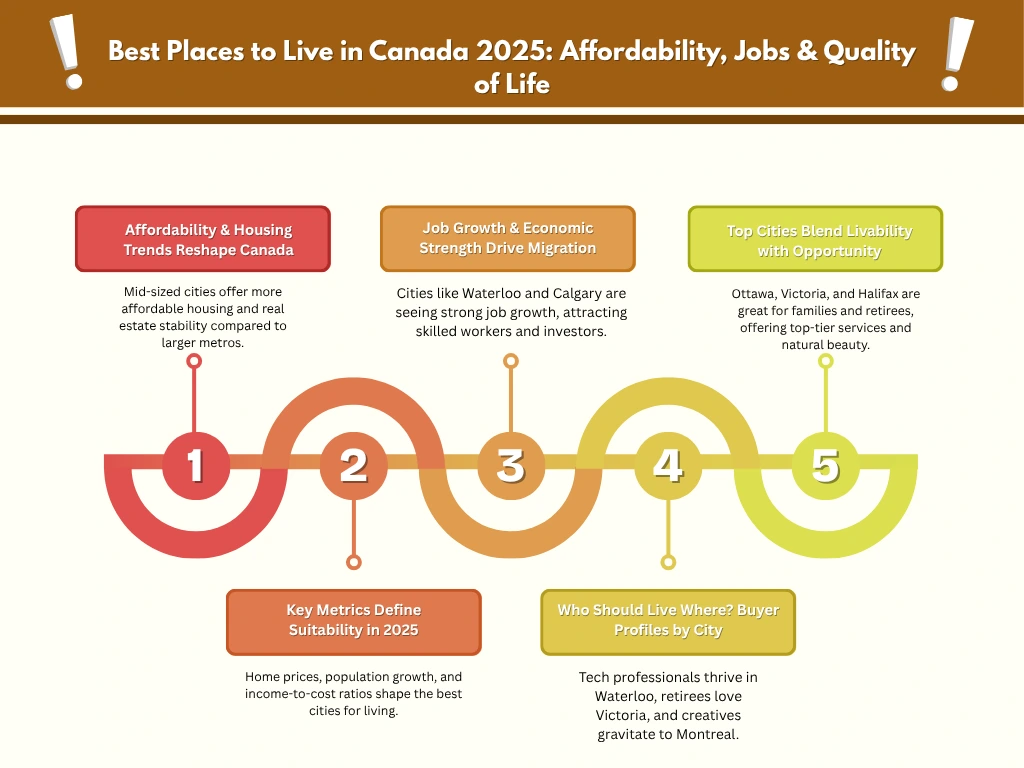Top 10 Best Places to Live in Canada in 2025


Table of Contents
ToggleCanada’s cities are experiencing rapid change in 2025. As affordability challenges intensify in larger metros, mid sized cities are attracting more attention due to their balance of cost, lifestyle, and opportunity. This evolving landscape has reshaped how we define the Best Places to Live in Canada.
Today’s top cities are more than just beautiful they offer economic promise, community focused amenities, and a standard of living that reflects Canadian values. From booming tech hubs to coastal retreats, each destination brings something unique to the table.
To determine the Best Places to Live in Canada, we assessed cities based on several key indicators:
Housing affordability (purchase and rental)
Local job market and income levels
Public infrastructure (transit, hospitals, schools)
Safety and environmental quality
Population growth and urban development
Lifestyle amenities and cultural offerings
This list provides a full snapshot of ten cities that rank highest across these factors in 2025.
As the nation’s capital, Ottawa leads with a combination of job stability, high quality public services, and affordability when compared to other major urban centres like Toronto or Vancouver.
Key Stats:
Average Detached Home Price: $599,000
Average Rent (2 bedroom): $1,970/month
Unemployment Rate: 4.3%
Median Household Income: $102,500
Residents enjoy efficient public services, excellent schools, and one of the lowest crime rates in Canada. The city’s bilingual workforce and consistent government employment make it ideal for public sector professionals and families. As such, Ottawa repeatedly earns its spot among the Best Places to Live in Canada.
Calgary continues to rise thanks to a diversifying economy and affordable home prices. While the energy sector remains a backbone, the city’s tech industry is booming.
Key Stats:
Average Home Price: $525,000
Cost of Living Index: 92.7 (vs. Toronto’s 107.6)
Population Growth: +2.8%
Calgary is a standout for skilled workers seeking a lower cost of living without sacrificing job opportunities. Its inclusion among the Best Places to Live in Canada comes as no surprise, particularly for those in trades or technology.
Halifax has emerged as a magnet for remote workers, students, and professionals looking to leave behind overpriced housing markets.
Key Stats:
Average Home Price: $462,000
Average Rent: $1,590
Population Growth: +3.1%
Internet Speed Rank: #4 nationally
This walkable, coastal city combines affordability, culture, and a strong sense of community. Halifax’s rapid growth and strategic investments make it one of the Best Places to Live in Canada for 2025.
Victoria offers a rare blend of urban sophistication and natural serenity. The city’s compact design, mild climate, and walkable neighborhoods appeal to health conscious residents.
Key Stats:
Average Home Price: $865,000
Rent (2 bedroom): $2,250
Public Transit Satisfaction: 82%
Days Above Freezing: 300+
Though costly, the quality of life here is unmatched. That’s why Victoria consistently ranks as one of the Best Places to Live in Canada, especially for retirees and healthcare professionals.
Rich in culture and history, Quebec City delivers affordable housing, reliable public services, and a strong sense of identity.
Key Stats:
Average Home Price: $371,000
Rent: $1,210
Homeownership Rate: 69%
Safety Index: Among the safest in Canada
French proficiency is key here, but those fluent in both languages will find Quebec City a rewarding and accessible place to live. Its stable real estate market secures its position on any list of the Best Places to Live in Canada.
Known as one of Canada’s premier tech hubs, Waterloo benefits from strong post secondary institutions, high startup density, and well paying jobs.
Key Stats:
Average Home Price: $720,000
Population Growth: 2.5%
Tech Job Growth: 10.2% YoY
Student Population: 60,000+
Despite rising home prices, the innovation driven economy continues to attract entrepreneurs and graduates. It’s easy to see why Waterloo is among the Best Places to Live in Canada for STEM professionals and tech workers.
Set in the picturesque Okanagan Valley, Kelowna offers natural beauty, an expanding job market, and increasing infrastructure investment.
Key Stats:
Average Home Price: $805,000
Population Growth: 2.6%
Residential Projects (2025): 30+ major developments
Vineyard & Wineries: 180+
Though fire risk and seasonal congestion are challenges, Kelowna is perfect for lifestyle seekers and remote workersearning it a solid place among the Best Places to Live in Canada.
Montreal is a dynamic and diverse metropolis with affordable living, excellent universities, and a thriving creative sector.
Key Stats:
Average Home Price: $542,000
Rent: $1,490
Cost of Living Index: 94.2
Major Universities: McGill, Concordia
Montreal’s cultural vibrancy and accessibility for newcomers ensure its spot as one of the Best Places to Live in Canada ideal for students, artists, and immigrants.
Saskatoon is on the rise. With its young demographic and growing economy, it offers opportunities in agriculture, tech, and construction.
Key Stats:
Average Home Price: $384,000
Median Age: 36.4
Agri Tech Investment (2024): $182 million
Cost of Living Index: 79.3
Saskatoon’s infrastructure and affordable housing make it one of the Best Places to Live in Canada for new families and first time buyers.
St. John’s is the perfect choice for those seeking a slower, more peaceful lifestyle without sacrificing affordability.
Key Stats:
Average Home Price: $321,000
Rent: $1,195
Internet Speed Rank: 16th in Canada
Cost of Living Index: 82.4
The community spirit and scenic beauty of St. John’s make it ideal for retirees, remote workers, and budget conscious buyers. It rounds out our list of the Best Places to Live in Canada.
| City | Avg Home Price | Growth Rate | Best For |
|---|---|---|---|
| Ottawa | $599,000 | 2.4% | Public sector, families |
| Calgary | $525,000 | 2.8% | Skilled workers, tech |
| Halifax | $462,000 | 3.1% | Remote professionals, students |
| Victoria | $865,000 | 1.7% | Retirees, health professionals |
| Quebec City | $371,000 | 1.3% | Francophone families |
| Waterloo | $720,000 | 2.5% | Entrepreneurs, STEM graduates |
| Kelowna | $805,000 | 2.6% | Lifestyle buyers, investors |
| Montreal | $542,000 | 2.3% | Creatives, bilingual workers |
| Saskatoon | $384,000 | 2.9% | First time buyers, tradespeople |
| St. John’s | $321,000 | 1.9% | Retirees, budget conscious movers |
Deciding where to plant roots is a deeply personal choice, but understanding your options is the first step. The Best Places to Live in Canada in 2025 offer a wide spectrum of choices from fast paced urban innovation to relaxed coastal charm.
Each city featured in this guide was selected for its livability, economic strength, and future potential. Whether you’re chasing career growth, better affordability, or a lifestyle change, there’s likely a Canadian city on this list that suits your needs.
With growing interprovincial migration, increased flexibility for remote work, and a national emphasis on community development, now is the time to re evaluate your ideal living environment. From vibrant Montreal to scenic St. John’s, the Best Places to Live in Canada are not only about statistics they’re about the kind of life you want to build.